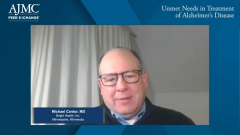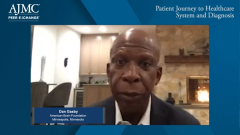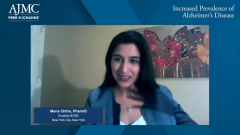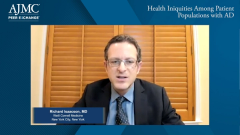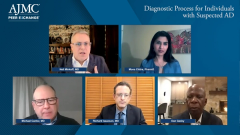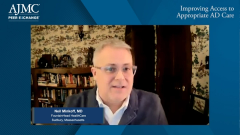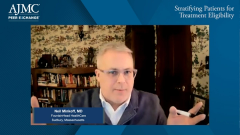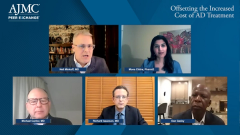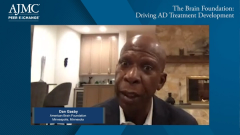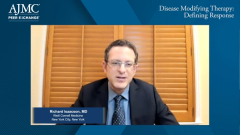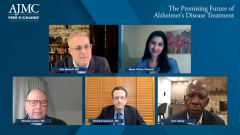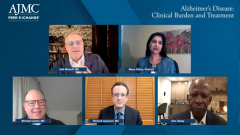
Patient Journey to Health Care System and Diagnosis
Panelists consider at what point in the disease development patients typically access the health care system for diagnosis and treatment.
Episodes in this series

Neil Minkoff, MD: That sounds like a good place for me to bring in Mr Gasby, in terms of understanding a bit about how a patient with Alzheimer disease, or maybe early memory loss before they have a diagnosis, starts to engage with the health care system and some of the challenges of getting those initial steps done.
Dan Gasby: One of the things you do not know is this: You start to see what I call little signs of difference, and it makes you question what is going on with your spouse in my case, or it could be a close relative or even a friend. You do not want to ask when they do something that is unusual: “Why did you do that?” The greatest example is if we are talking right now, and all of a sudden I say, “I want a sandwich on Tuesday,” and then I come right back to the conversation. You may find it funny, amusing, or whatever, but there was something there that happened. It was not funny, and it was not amusing, but everything works perfectly after that.
That is an example of the little signs of difference, and those things begin to build and accumulate. Those things in hindsight or after you get the diagnosis start to make you realize that it did not start when you got the diagnosis. It started well before that, and that is a tough thing because you do not want to accuse someone: “You are broken. What is wrong with you?” This is normally what happens because it is so atypical, and there is a stigma to putting someone down or saying, “Why did you do that? Why did you embarrass me? Why did you embarrass yourself?”
It is a question that I learned the hard way because I could not believe what my wife started to do. I can say this honestly to our audience: I was married to someone who, for me, was perfect. We went through 18 years of never having 1 argument. We moved as 1, we thought as 1, we could talk to each other across the room with just our eyes. Then all of a sudden, when you look across that room, and those eyes do not connect, or what comes out of that person’s mouth is not what you expect, it makes you uncomfortable. You do not want to believe that there is something wrong. You slough it off and think, “Maybe she or he is tired, or maybe there is minor depression, or maybe they just had a bad day.”
As that accrues, you begin to see that situation more and more, and that is when it gets to the point where you have to have a conversation to sit down and say, “I see something.” They say, “If you see something, say something” when we talk about terrorism. Alzheimer disease is domestic terrorism not only for the person who is going through it and experiencing it but also for the family members who have to care for them, because you cannot negotiate with a terrorist. You have to deal with the situation and try to mitigate it or minimize it because you cannot eradicate it.
Neil Minkoff, MD: Outstanding analogy. My follow-up question is this: When taking those concerns to your clinicians, your medical team, your doctors, or whomever, was it difficult to get traction beyond, “Is it depression, or are they just tired?” and things of that nature—to get to the diagnosis?
Dan Gasby: Let me be very candid. We had to go through several doctors because 1 doctor diagnosed my wife as being depressed. She was not depressed as much as she was confused, and they loaded her up on antidepressants, which is almost like it compounded whatever she was going through. There was an accelerated multiplier factor, and I realized she was starting to hallucinate. I always believe that, if you are going to deal with something, then you need to go and ask more than 1 person. I went to another doctor, and he looked at her, asked her several questions, did some rudimentary things about reasoning, and said she needs to have a test to understand her mental capacity. When we had that, we saw that there was some neurological damage and cognitive impairment. If I had just stayed with the same doctor, who knows how long I could have had her on antidepressants, and who knows what result that could have been.
Neil Minkoff, MD: You have had experience as a family member and as a caregiver, but you have also been speaking eloquently about the stigma and difficulty getting the diagnosis. What can be done? You talk about making the brain sexy. What can be done to try to get family members to work with patients to try to push them toward getting a diagnosis they might not want?
Dan Gasby: They say that the shortest distance between 2 points is a straight line. I have been taught that the shortest distance in life is the truth. You have to tell people the truth. You have to sit there and say, “This is what is going to happen, and this is how it is going to impact you. This is how it is going to possibly impact your pocketbook. This is how it is possibly going to impact your quality of life.” You have to be honest. You cannot sugarcoat this. You cannot shine this. To be forewarned is to be forearmed. We have a tendency in America to gloss over things that are tough and to get into the minutiae of things that do not matter. As the good Mona Chitre said, we have got to do a deep dive into this, and we have to constantly find different ways to tell the truth. That is what has to be done, and if we do not do it, then we are going to do a great disservice to our population that is the largest population in this country. More important, we are going to undermine the whole medical and health care system. It is time to tell the truth.
Transcript edited for clarity.
Newsletter
Stay ahead of policy, cost, and value—subscribe to AJMC for expert insights at the intersection of clinical care and health economics.
